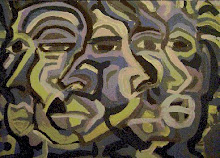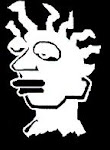All I.Q.tests are culturally biased.
I.Q. tests don't really measure what it is that you do know so much as they measure what you don't know about a predetermined set of qualities that the testing group attempts to pass off as being most important.
If, in the image above, ones I.Q. is quantified by the likely conformity to the highlighted area - is someone who falls outside of the box less smart?
Or is the test just looking at things from a limited perspective?
The breadth of ones knowledge is usually determined by what is most important withing any given environment.
A fragile, nerdy, guy who can write code - but who lives in a jungle where there is no modern technology - might not be able to survive for long if he fails to acquire the knowledge, skills and resources that the jungle environment requires.
The indigenous man would have all of the needed social skills and knowledge needed to survive the same environment.
In this case, what good would a high I.Q. be?
Or, would one have to change the qualities which determine the level of ones I.Q.?
Sunday, October 17, 2010
Subscribe to:
Post Comments (Atom)















No comments:
Post a Comment